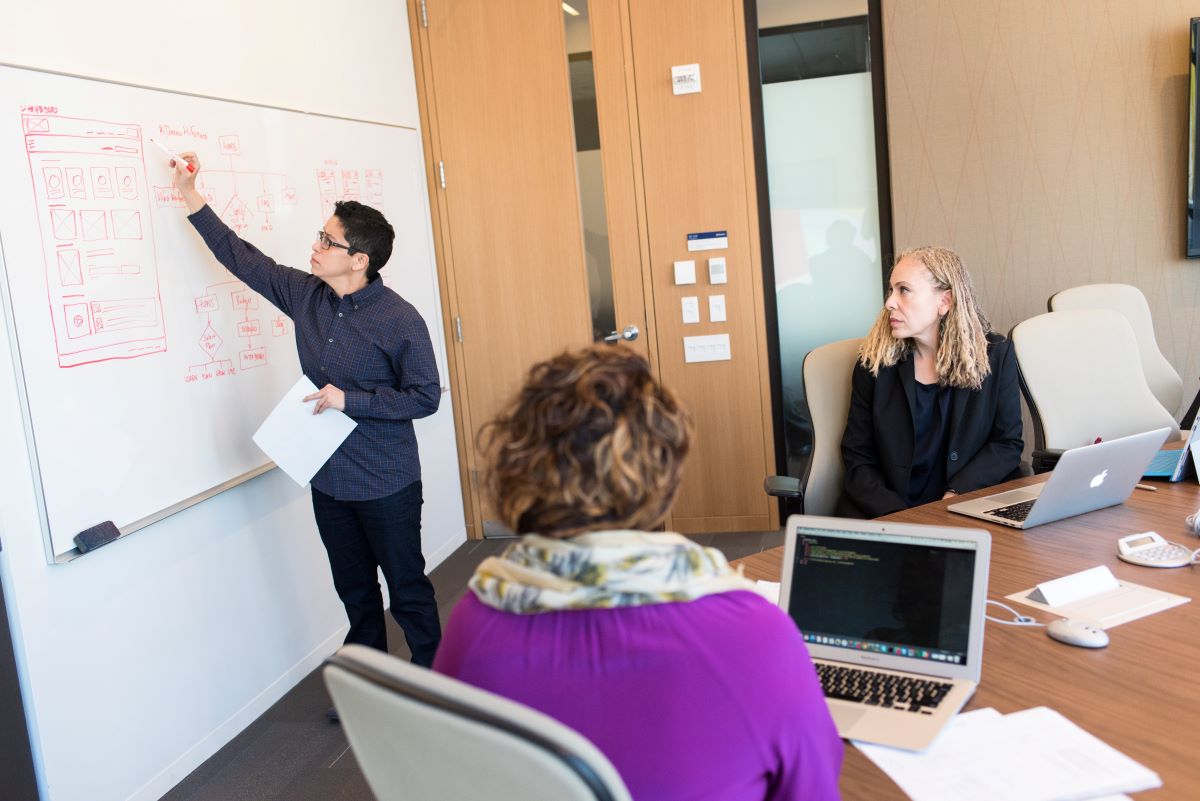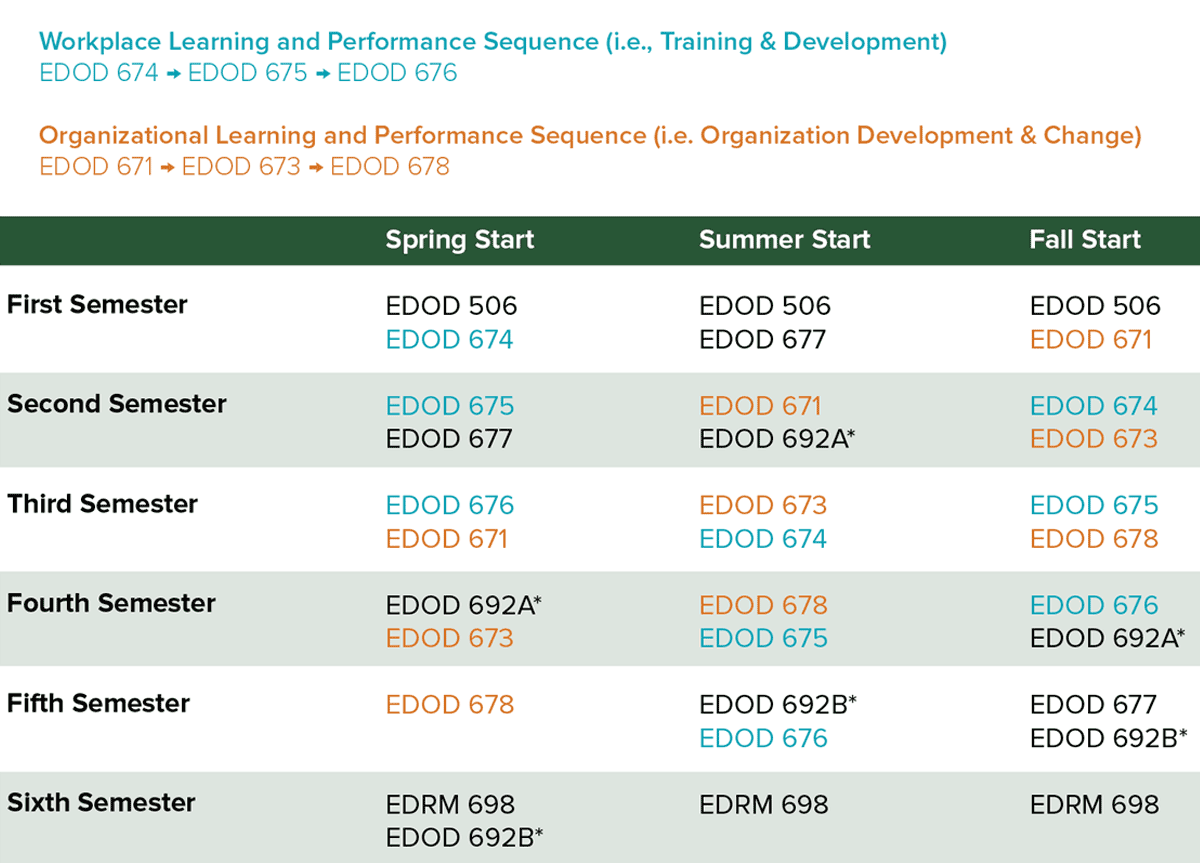


Select one of the options below:

CSU’s online Master's program in Organizational Learning, Performance, and Change (OLPC) is specifically designed for professionals passionate about fostering growth, empowerment, and maximizing human potential in rapidly evolving diverse organizations.
Dive deep into the intricacies of talent development, coaching, learning and change theories, performance improvement, and more. With a focus on practical applications, you'll acquire the skills to drive meaningful change, optimize performance, and cultivate a culture of continuous learning within organizations.
Through research-supported curriculum and interactive online learning, you'll develop the skills and strategies needed to inspire and cultivate the talents of individuals, nurture high-performing teams, and drive sustainable organizational success. Join a community of like-minded professionals and unlock limitless possibilities for personal and professional growth.
Hear how CSU’s OLPC coursework helped Pattie Strong navigate her company’s merger and how she applied learnings to make an immediate impact.
“I loved that my professor came from business and professional backgrounds. So, when I had questions about what was happening at work with a reorganization or a coaching plan for my team, I could go to my professors and get real time answers and advice.”
–Pattie Strong
Learn to address challenges involving employee strengths, interaction, and performance to build programs and deliver custom improvement interventions that help organizations function more effectively. Throughout your course of study, you will apply what you are learning to an actual organization and initiate practical solutions for a real-world environment.
CSU faculty, known for both their research and industry expertise, teach to their specialties and share their wealth of experience in the online classroom. Each course provides opportunities for frequent and meaningful one-on-one interactions with faculty through a variety of mediums, including: video chat, online discussions, and email.

Work with C-ALT researchers to bridge the gap between research and practice and prepare yourself to actively contribute to shaping the future of training and learning.
The OLPC curriculum is tightly linked to the research being conducted at CSU within the Center for the Analytics of Learning and Teaching. You will learn how to design and implement data collection methodologies and how to analyze and interpret large-scale datasets, through actual research projects like U-Behavior.
The ability to work with learning/training datasets will deepen your understanding of learning processes and contribute to evidence-based decision making. Former students tell us that they truly appreciate this unique feature of the OLPC program:
“Collaborating with C-ALT researchers grounded the theory. We engaged in cutting-edge research projects and explored innovative approaches to understanding and enhancing learning outcomes. It was a truly unique and formative experience.”
Our faculty prepare you to facilitate learning, performance, and change in business, industry, government, military, medical, social service, and nonprofit organizations. Potential careers include:
Graduates of this master's program have been employed by these recognized businesses and organizations and continue to problem-solve and network together long after graduation (partial list):
Dr. Lynham is an associate professor at Colorado State University and Chair of the Organizational Learning, Performance, and Change (OLPC) Program in the School of Education.
She earned her M.A. degree in Organizational Leadership from the University of St. Catherine, Minnesota. Her M.Ed. and Ph.D. degrees in Human Resource Development are from the University of Minnesota, where she graduated in 2000. Susan has over 20 years practical experience in human resource development (HRD), with a special passion for organization development (OD), and has consulted and presented nationally and internationally in these areas. She has also taught at a number of academic institutions during her career, including the University of Minnesota, Louisiana State University, and Texas A&M University.
Susan focuses her teaching and research expertise in the areas of responsible leadership, scenario planning based leadership development, national human resource development, constructivist inquiry, and theory development in applied disciplines. She is an engaged member of the HRD scholarly community, both locally and abroad. As such she has served as an elected board member of the Academy of Human Resource Development, is the past Editor-in-Chief of the Academy of Human Resource Development journal Advances in Developing Human Resources, and serves on the editorial board of a number of core journals in the field.
A native of South Africa, Dr. Lynham enjoys regular visits to her home country—for purposes of both pleasure and work! The diversity of her background enables her to study and practice her field across a spectrum of national cultures, and contexts of complexity.

Tom is a Professor in organizational studies at Colorado State University, where he serves as chair of the university’s Ph.D. program in Organizational Learning, Performance, and Change (OLPC). Tom teaches courses on scenario planning, human expertise, analysis in organizations, change management, and organization development. With a focus on the theoretical foundations and outcomes of scenario planning, Tom's research has won several awards for excellence based on demonstrating the benefits of scenario planning.
Tom is also the founder and Director of the Scenario Planning Institute, an organization that documents scenario planning activity, tracks research, facilitates seminars, and consults with organizations nationally and internationally.
In addition to his academic activities, Tom maintains his passion for serving industry and public clients as an advisor through Chermack Scenarios, a scenario planning consultancy. Tom facilitates scenario planning projects that yield insights resulting in an enhanced ability to navigate environmental uncertainties.
Connect with Tom for questions about the practice of scenario planning. He can be reached through the following links:
chermack@colostate.edu | (612) 387-1951
linkedin.com/in/thomasjchermack

James Folkestad is a professor and University Distinguished Teaching Scholar (UDTS) at Colorado State University (CSU) and a faculty member within the Organizational Learning, Performance, and Change (OLPC) Program in the School of Education.
He earned his Ph.D. in Educational Human Resource Development (EHRD) from Texas A&M in 1996. He is dedicated to the scientific investigation of how technology can be used to enhance learning, training, and innovative practice. His research has included the use of rapid visualization and prototyping technology to accelerate learning, collaboration, and production in both the manufacturing and construction fields. He is currently working on U-Behavior™ a HI-OD learning and teaching method that applies learning analytics to empower self-directed learners. His work also includes the use of serious games (educational video games) and to impact the strength and persistence of training and learning for the Intelligence Advanced Research Project Activity (IARPA). In addition, he is the Director of the Center for the Analytics for Learning and Teaching (C-ALT) a University Center dedicated to advancing the use of analytics to drive teaching and learning innovation.
James continues to consult with organizations on the use of technology for training and the potential use of electronic data and analytics for increasing the strength and persistence of training effects. He has authored over 40 peer reviewed research articles and his research has appeared in scholarly publications such as Advances in Developing Human Resources, Journal of Science Education and Technology, and Simulation and Gaming.
Howard Lewis is an instructor of Organizational Learning, Performance and Change (OLPC) in the School of Education at Colorado State University.

Zach holds a Ph.D. in Organizational Learning, Performance, and Change from CSU's School of Education and is an organization and leadership development consultant who works with a wide variety of organizations.
His research interests include the lived experience of meaningful work, purposeful leadership, purposeful organizations, purpose in work, positive leadership, positive organizational behavior and development, fulfillment in work, organizational commitment, and organizational culture.
As a student in CSU’s online organizational learning, performance, and change master’s program, you will receive a degree from a regionally accredited, renowned research institution while taking courses at times and locations that fit your busy life. Additionally, you can expect a program that offers:
Companies, institutions, nonprofits, schools, political parties, and associations are all examples of organizations. Most have some kind of structure or hierarchy, along with a strategy for achieving an overall mission or set of goals. Organizational development is a specialized field of study concerned with the structure, management, and strategic development of organizations.
Organizational learning focuses on helping individuals, teams, processes, and entire organizations perform better. By gathering qualitative and quantitative information, experts in organizational learning can evaluate the effectiveness of an organization's structures, processes, and goals. After completing an evaluation, these experts can then recommend specific strategies for improving overall performance across multiple groups or departments.
An in-depth understanding of organizational development can be combined with a wide array of prior expertise, including business, healthcare, military, engineering, IT, government, criminal justice, and more. By blending your previous career experience with the advanced knowledge you will gain in an organizational development degree program, you will become more prepared to shape organizational change and make a positive impact.
No, you do not have to write a thesis to complete this program. You will, however, be required to complete a large final project and presentation.
Assignments in this program are problem-focused, practically applied, and theory-to-practice oriented. To make the most of these projects, you should plan to apply learning to real workplace issues and challenges and obtain the expertise required to make significant contributions to improvement efforts in an organization.
This organizational and human resources development program is skills-based and uses action learning, an educational process in which students study their own actions and experiences to improve performance and acquire knowledge through those actions and practice. In action learning projects, students take concepts and tools from the classroom into their organizations with faculty support. As part of these projects, a great deal of reflection and data is used to consider a variety of potential solutions to complex problems involving human expertise, interaction, and performance.
Hear what OLPC master's students have to say about the online learning experience, the engagement between students and professors, and the ways they were able to apply what they learned in the program to their professional lives.
See how Pattie was able to use what she learned in class to help guide her company through big changes, including a merger.
Learn how CSU's program helped Elise to get her master's without putting career opportunities on hold. By studying online, she was able to get her coursework done, even while living in the Philippines.
The immersive curriculum focuses on building your skills in facilitating learning, performance improvement, and change in an organizational setting. Your studies will incorporate training and development skills for improving individual and team effectiveness, and organizational development concepts and tools for driving performance and managing change. All courses in this degree are 12-weeks in duration.
The research course is a comprehensive course which culminates the knowledge across the program into an individual applied learning project similar to a capstone project and is taken during the last semester of your program of study.
Please reach out to the department advisor with any curriculum or course substitution questions.
The program of study below outlines how you can complete the degree in two years by taking two courses at a time. The two tracks that make up the core of the program have been designed sequentially, with each course preparing you for the next. Other courses can be taken as available. Summer courses are required to complete the program and are counted in the semesters noted below. You must have 33 credits to graduate.
This program is comprised of two tracks. It is recommended that you complete the courses in each track in sequential order. They are:

Required Courses:
*Note: EDOD 651 can be taken in lieu of EDOD 692A in the program of study noted above. EDOD 652 can be taken in lieu of EDOD 692B in the program of study noted above. EDOD 651 and 652 are available in the Fall and Spring and can be taken at the same time. However, if they are not taken together, they must be taken in the proper sequence (i.e., EDOD 651/692A, then EDOD 652/692B).
A maximum of nine credits in EDOD courses taken at Colorado State University can be applied to this program before admission. A maximum of three credits can be transferred in from other universities if approved by the program coordinator after admission.
Our faculty use student-led group discussions, lectures, readings, research, and writings in their courses. Assignments develop critical thinking skills through projects that are problem-focused, practically applied, and theory-to-practice oriented. To make the most of these projects, you should plan to apply learning to real workplace issues and challenges and obtain the expertise required to make significant contributions to improvement efforts in your organization.
This organizational and human resources development program is skills-based and uses action learning, an educational process in which students study their own actions and experiences to improve performance and acquire knowledge through those actions and practice. In action learning projects, students take concepts and tools from the classroom into their organizations with faculty support. As part of these projects, a great deal of reflection and data is used to consider a variety of potential solutions to complex problems involving human expertise, interaction, and performance.
| Fall semester | June 15 |
Start your application online and upload materials directly into the online system. You can save your progress and return any time.
Apply NowMeeting the minimum requirements does not ensure admission to the OLPC specialization. Admission is based on a number of factors, including prior academic and professional experience, your personal statement, and fit with the program.
Prepare the materials below and upload when you apply online.
Complete the online graduate application and pay the nonrefundable application processing fee (payable online). As soon as you have completed the required information, please submit your application. Your application will not be reviewed until it is complete and all required materials have been received.
Request one official transcript of all collegiate work completed from all institutions attended. Transcripts from Colorado State University are not required. Transcripts must be received directly from the originating institution to be considered official.
Please Note: Students may be unconditionally admitted and registered in their first semester of courses with an unofficial transcript. Official transcripts must be submitted, prior to or during your first semester, before you can register for your second semester of graduate work. Failure to meet this condition will result in your dismissal from the Graduate School.
Electronic (preferred): Digital Transcripts must be submitted by the originating institution using a secure service such as parchment, eScrip-Safe, the National Student Clearinghouse, or e-Quals. Transcripts received via emails are considered unofficial. Use institution code 4075 for Colorado State University or gradadmissions@colostate.edu if the secure service requires an email address.
Mail (if necessary) Graduate Admissions Colorado State University – Office of Admissions 1062 Campus Delivery Fort Collins, CO 80523-1062
View your application status at any time to ensure your application checklist is complete or to check on updates.
Selection Timeline Applications are reviewed monthly on a rolling basis. Faculty review of applications takes approximately 4-6 weeks.
Proof of English language proficiency is required for applicants from countries or United States territories where there are official languages other than (or in addition to) English. This includes the U.S. territories of American Samoa, Guam, the Northern Mariana Islands, and Puerto Rico.